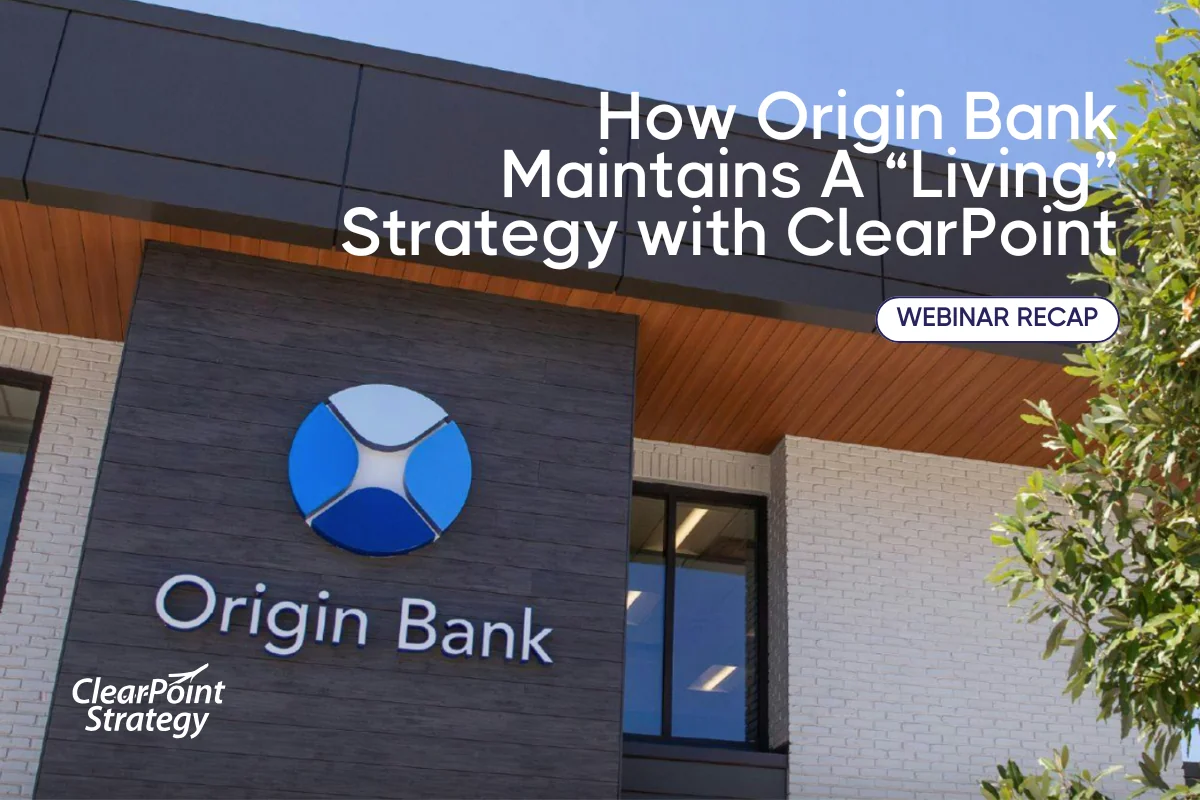Learn about the OKR framework and how it fits into strategy management systems.
Let’s start with a little history about objectives and key results (OKR): You may recognize the acronym because the leaders of two technology juggernauts have credited the OKR framework for their companies’ growth: Intel and Google. Due to its reputation for success, this system has been adopted by other companies in Silicon Valley and beyond.
Using OKRs is a simple way to set, track, and measure goals on a repetitive (usually quarterly) basis. The structure of the process creates alignment and engagement around these goals—otherwise known as objectives. In short, everyone knows their direction and aim, and works at a fast, consistent pace to get there. As venture capitalist and OKRs guru John Doerr puts it, “The objective is what I want to have accomplished. The key results are how I’m going to get it done. The objectives are typically longer lived. They’re bold and aspirational. The key results are aggressive, but always measurable, time-bound, and limited in number.”

Can OKRs solve all of an organization’s strategy challenges? Maybe. The framework is an incredibly useful tool to track and measure your goals, but it’s not the end-all, be-all of strategic planning.
Keep reading and I’ll explain more.
How OKRs Work
At the basic level of the OKR framework, you choose three to five objectives (the most important things to accomplish in your organization), and then assign three to five key results to each objective. Keep in mind this isn’t supposed to encompass every task or metric—you’re choosing what efforts to prioritize above all others. Also, sometimes you are not choosing, your boss is choosing for you.
This is a hierarchical system, so OKRs are first set at the organizational level, and then rolled down to departments and then teams, and so on. When creating the objectives and key results, they should link together and cascade downward. Then, when measuring progress, the results will roll upward, so, when employees achieve their goals, managers should achieve their goals, then the division chiefs, etc.
How does the OKR system work in practice? Each key result is normalized on a 100 percent or 0-1 scale. For example, if you had to ship 50 boxes in a month and you only shipped 40, your results scale would be 80 percent or .8. If the key results are weighted equally, the achievement of your objective is also on a 0-1 scale. Further, if you weigh the objectives, you can roll up an employee’s score on a regular basis (again, this is usually quarterly) and determine if an employee achieved 80 percent or .8 of their objectives. Consistent achievement is good for bonuses, promotions, and raises, and underachievement is a sign that the role is not a good fit for the employee.
Pros & Cons Of OKRs
Because of the framework’s simplicity, it’s easy to see why using OKRs is so popular. With the right controls and structure, you can achieve great results—something that has been proven by companies over and over, starting back in the 1970s with Intel. But is the OKRs system right for you? Here are some advantages and disadvantages:
Pros
- It has a sharp, continual focus on goals and measures.
- It states explicit responsibilities for employees.
- It is an easy, standardized measurement system (everything is normalized to 100 percent) with clear alignment between objectives and results.
- It uses a bottom up, “reverse” waterfall effect between layers of management that can foster a more engaged environment.
Cons
- It has a heavy focus on individual evaluation, which discourages team behavior and collaboration.
- It makes it more difficult to track the status of projects.
- It is less flexible for objectives without clear-cut, quantifiable measures.
- Its prescriptive approach can be perceived as limiting or micromanaging.
- Its siloed control can lead to misalignment across departments or objective overload.
OKRs Vs. KPIs Vs. Balanced Scorecard
Using OKRs is an effective approach to strategy management, but it’s not the only one. If you think of strategy management as a spectrum of complexity, KPIs are on one end and the Balanced Scorecard is on the other, with OKRs in the middle.
If your organization knows its growth drivers and can scale them, OKRs will work great for you. But some companies may find the OKR system too limiting or too siloed. For example, you may want a different framework if:
- You exist in more of a knowledge-based or innovation-driven organization where lots of objectives don’t have clear measures.
- You don’t know if your leading indicators will get the lagging results.
In short, if you have some murkiness around growth drivers and measures, OKRs might not be the best fit. So, what are your other options? Here’s a quick breakdown of how strategy can be managed with KPIs or a Balanced Scorecard:
KPIs
KPI management is a simple as determining which measures are most important for your organization and tracking them. You’d likely give your team a handful of KPIs to focus on, but keep the larger strategy hidden. For example, a restaurant may share with its staff KPIs like # of days since last accident or # of wine bottles sold. Employees would know they were working toward those numbers, but wouldn’t be privy to high-level strategies around safety or revenue.
On the positive side, KPIs can get everyone on the same page and working as a team toward simple, direct goals. But the disadvantage is there can be less accountability and less transparency on who contributed what; plus, it’s not always clear that the KPIs capture the full story of the company’s success. You need to have the right mix of leading and lagging indicators.
Balanced Scorecard
The Balanced Scorecard (BSC) is one of the more robust and comprehensive management systems. We’ve written a lot about it and there is some overlap with the OKR framework, but also distinct differences.
BSC links projects together and has a governance system, giving you the ability to measure performance across four different perspectives. BSC incorporates more strategic elements such as projects and milestones, whereas OKRs incorporate more operational measures.
One of the biggest benefits of BSC is it allows for some subjectivity and flexibility. If not all of the targets are defined in your strategy, or you don’t know the right indicators but still want to grade your objectives, BSC can accommodate that. You can assign accountability and encourage teamwork, versus the lone-wolf tactics of OKRs. You can:
- Link projects to your strategy (your objectives).
- Evaluate projects and KPIs, including qualitative analysis.
- Make changes throughout the year to adjust your strategy as needed.
- Link departmental efforts based on contributions that aren’t purely mathematical.
BSC helps everyone in the organization understand the overall strategy and where they fit in. Employees are motivated to contribute and make decisions when it benefits the overall strategy, even if it’s not specifically defined in the key measures they’re tracking. One potential disadvantage of BSC is there must be buy-in across the organization, especially from the leadership team—if you don’t have that, it won’t be successful.
OKR FAQs
-%2520The%2520Strategists%2520Guide%2520(2).webp)
ClearPoint fits any framework.
OKR, KPI, BSC—ClearPoint can help you manage any framework you choose. If you just want to track and measure five KPIs, we can do that. If you have objectives and key results, you can automatically aggregate information from individuals up to departments, divisions, and more. And our system is tailored to support the BSC method.
Need help creating OKRs of your own? ClearPoint software can take care of everything for you - from start to finish. See how!

.svg)
_%20%20The%20Strategist%27s%20Guide.webp)





